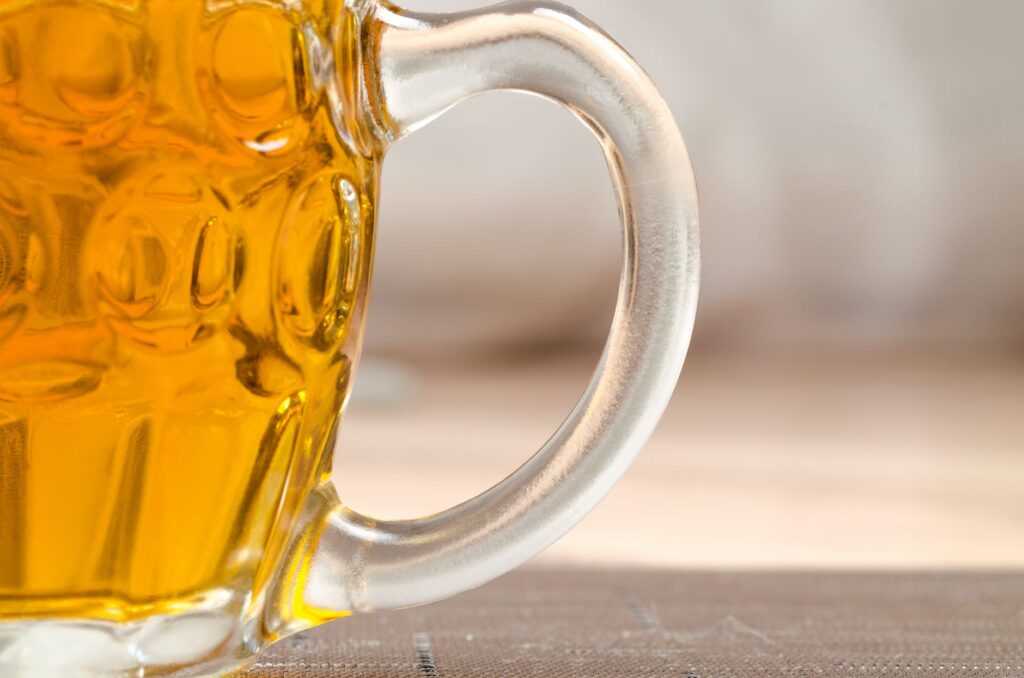Homemade beer can be a fun and rewarding hobby, and it doesn’t require a lot of equipment or experience to get started.
In this guide, we’ll walk you through the basic steps of brewing your own beer and introduce you to some of the different products you’ll need to use.

Homemade Beer Ingredients
The four main ingredients in beer are water, malted barley, hops, and yeast.
- Malted barley provides the fermentable sugars that will be converted into alcohol.
- Hops add bitterness and flavor.
- Yeast is used to convert the sugars into alcohol and carbon dioxide.
- Water is obviously the primary ingredient in beer, and it’s important to use clean, fresh water that’s free from contaminants.
Equipment
To make beer at home, you’ll need a few basic pieces of equipment:
- You’ll need a large pot or kettle for boiling the wort (the unfermented beer).
- A fermenting vessel (such as a plastic bucket or glass carboy).
- An airlock to prevent contamination during fermentation.
- And bottles or a keg for storing the finished beer.
Homemade Beer Process
The brewing process involves several steps, including mashing, boiling, fermentation, and bottling.
Here’s a brief overview of each step:
Mashing:
Crushed malted barley is mixed with hot water to create a mash, which is held at a specific temperature for a period of time to activate enzymes that convert the starches in the barley into fermentable sugars.
Boiling:
The sweet liquid (called wort) is boiled with hops for flavor and bitterness.
This also sterilizes the wort and helps to concentrate the sugars.
Fermentation:
The cooled wort is transferred to a fermenting vessel, and yeast is added to begin the fermentation process.
During fermentation, the yeast consumes the sugars in the wort and produces alcohol and carbon dioxide.
This process can take anywhere from a few days to several weeks, depending on the style of beer and the temperature of the fermentation.
Bottling:
Once fermentation is complete, the beer is transferred to bottles or a keg for storage.
If using bottles, a small amount of sugar is added to the beer before bottling to create carbonation.
Homemade Beer Products
Malt Extract
Malt extract is a concentrated syrup or powder made from malted barley that’s used to make beer.
It’s available in both liquid and dry form, and is a popular choice for beginner brewers because it’s easy to work with and eliminates the need for a full mash.
Hops
Hops are the flowers of the hop plant, and are used to add bitterness and flavor to beer. They’re available in several different varieties, each with their own unique flavor and aroma.
Some popular varieties include Cascade, Centennial, and Chinook.
Yeast
There are several different types of yeast that can be used for brewing beer, including ale yeast, lager yeast, and wild yeast.
Each type of yeast produces a different flavor profile and works best at a specific temperature range.
Sanitizers
Sanitizers are essential for preventing contamination during the brewing process.
There are several different types of sanitizers available, including iodophor, Star San, and bleach.
It’s important to follow the manufacturer’s instructions carefully to ensure proper sanitation.
Bottles
If you plan to bottle your beer, you’ll need to have enough bottles on hand to hold all of the finished beer.
Use bottles that are designed for beer, as they are thicker and more resistant to pressure than regular bottles.
Craft a Brew ⇒ Read Our Review HERE
Kegging Equipment
If you prefer to keg your beer, you’ll need a kegging system that includes a keg, a CO2 tank, a regulator and a dispensing system.
Kegging can be a convenient option for homebrewers who want to avoid the hassle of bottling and want to serve their beer on tap.
Thermometer
Temperature control is important throughout the brewing process, so a thermometer is an essential tool for homebrewers.
A digital thermometer is accurate and easy to use, and can be used to monitor the temperature of the mash, the wort, and the fermentation vessel.
Hydrometer
A hydrometer is a tool used to measure the specific gravity of the beer at various stages of the brewing process.
This measurement helps the brewer determine the alcohol content of the finished beer and ensure that fermentation is proceeding as expected.
Brewing Software
Brewing software can be a useful tool for homebrewers who want to track and refine their recipes.
These programs can help with everything from recipe formulation to fermentation tracking, and can be a valuable resource for brewers of all skill levels.
Tips for Success
- Clean and sanitize all equipment thoroughly to prevent contamination.
- Use high-quality ingredients to ensure the best possible flavor.
- Follow the recipe carefully and don’t make substitutions without understanding the impact on the final product.
- Monitor the temperature carefully throughout the brewing process to ensure optimal fermentation.
- Be patient – beer takes time to ferment and mature, so don’t rush the process.
Conclusion on Homemade Beer:
Making homemade beer can be a fun and rewarding hobby that requires some basic equipment and ingredients.
The process involves several steps, including mashing, boiling, fermentation, and bottling, and requires careful temperature control and sanitation to ensure the best possible flavor.
By using high-quality ingredients and following a recipe carefully, homebrewers can create delicious beers that rival those produced by commercial breweries.

